|
|
|
|
#1
|
||||
|
||||
|
Interesting. What did these sell for in the early &0s? Seems like a lot of trouble to find old paper to reprint these Bond Bread cards. And we find some of the movie star cards suspicious too?
|
|
#2
|
||||
|
||||
|
|
|
#3
|
|||
|
|||
|
Quote:
Long term collectors have always been suspicious of the Festberg set and they put no value to it. In 2009, Post #49 above noted that a complete Festberg set of 24 sold at auction for $102. Another responded that he saw the auction but didn't think anything of it, but had he known it was only $102 he would have bid. Today, Festberg sets are seen offered on eBay as "Bond Bread" sets generally for around $500 to $1,000, though some have sold for as little as $250 while others over $1,000. Again, these are all usually described as "Bond Bread" sets. A Jackie Robinson card from the Festberg remainders, if offered in a slab of a card grading service that identifies it as a "Bond Bread" card, have sold for over $1,000. Generally, though, an ungraded Robinson from the Festberg remainders can be picked up for $50 to $100. In my Post #203 OF 05-10-2020 above, I pictured four of the Festberg remainder cards I had asked SCG to grade shortly after I have received it. Three cards were slabbed and labeled as "1947 Homogenized Bond Bread" cards. SCG would not grade the fourth card, the Jackie Robinson, saying it had been trimmed. Unwittingly, SCG may have given us an answer to the cause of the brown toning on those cards. Many are likewise "trimmed." If you look at the edges of some of them, you can see a heavy dark brown mold much deeper in color than the more uniform brown toning on the back. The set was highly promoted in the 1980's and apparently the over 3,000 sets found sold out. It is not unreasonable to assume that the more severely damaged cards of the find had their edges trimmed to remove the more obvious mold when the supply of sets decreased. The unanswered question not yet addressed in this thread is what effect did that brown mold have on the cardstock of the Festberg cards. People have been just looking at them as a toned something and assumed they were always thinner than Bond Bread and Sport Star Subjects cards. In May 2016, Kevin O'Gara asked what are real Bond Bread cards worth. Leon replied in June, "Generally speaking it's not an expensive set relative to others." From the information Griffon512 has recently provided, the Jackie Robinson round corner card he was offering at over $3,500 has been sold. The card had been identified by SCG as a "Bond Bread" card and given a high grade. It will remain difficult to say what are realistic prices for actual 1947 Bond Bread package inserts until clear guidelines distinguishing them from round-corner Sport Star Subject cards are generally acceptable. There is little question today that anyone would damage a high-grade round-corner Sports Star Subject card so that it would appear to have the wear and tear s) would have. Recently, a dealer on eBay offered 9 separate auction lots of individual Bond Bread cards with a starting bid of 99¢. While only in "average" condition (cards not especially cared for over the years), only one had a crease. I was the only bidder on 8 of the lots. The ninth I won at a one bid raise over $5. So what are Bond Bread inserts worth? Also on eBay is a dealer offering a complete set of Screen Star Subjects cards at $249.95. I arrived here at this thread a few months ago looking for information on what I thought were Bond Bread cards. My eyes glossed over trying to understand the so many different sets the thread had virtually passed on by mere reference. I do understand Ted's concerns. The world was trying to tell him that the actual cards of his childhood memories were something they were not. Looking at the subject with "fresh eyes," I saw that while these many "imposters" (impostors) were a challenge to Ted, they too were also ignored. The bulk of the cards were not widely known in collector circles, and where known, more often than not, little of anything else about was known. Clutch-Hitter, I'm not sure I'm going in the direction you sought. Like most of us, you probably have seen your fill of modern cards and their manufacturer created limited print "rarities." Hundreds of millions of Bond Bread cards were inserted into bread packages. Where are they? It is virtually impossible to complete a set in average condition, but you can complete a set of what are called "Bond Bread" cards in near mint or better condition. I'm sure that Charleybrown has spent many enjoyable years just trying to gather sufficient information to accurately date and describe the 13 cards of the Bond Bread special Jackie Robinson set. And that's what it's all about, learning new things and having fun. My 1988 1st edition of the Standard Catalog puts the special 13 card Jackie Robinson set at $3,150 NM, with all of the individual cards at $250 NM each, except the Robinson Portrait Card (with facsimile autograph), which it values at $150 NM. Today, you couldn't touch a single NM card of the set for the 1988 price of the complete set (and probably could not find a complete in that condition offered for sale back then). The 1988 Standard Catalog does not mention Bond Bread package insert cards. What has caused much dispute recently in this thread is a set of cards called Bond Bread cards in high grade that was sold along with a complete set of the four Sport Star Subjects boxes in May 2020 on eBay for over $4,500. Many old-timers believe the cards to be genuine 1947 Bond Bread cards with the Sport Star Subject Boxes an add-on. Others, like myself, believe the cards are from those Sport Star Subject boxes. It has yet to be explained why so many cards have turned up in recent years in high grade that are called "Bond Bread" cards, when the actual package insert cards old-timers acquired back then are not now in the same high condition? Would the actual population of high grade cards make a true 1947 Bond Bread insert graded 7 more valuable than a Sport Star Subjects card graded 7.5, 8 or 9? I looked in some old 1990 Sport Collector Digest (SCD) and other 1990 card newspapers I have and could find no ads (not even classified ones) mentioning Bond Bread insert cards. New issues were the big thing. PSA's website shows they have graded some 52,816 1985 Topps #401 Mark McGwire Olympic "Rookie" cards with 42,426 of them at PSA 8 or better. In 1990, the McGwires in PSA 8 were being sold above $200 and touted as investments. Today, PSA's on-line price guide puts that PSA 8 McGwire at $15. But a lot of people had a lot of fun in the late 1980's just trying to find one. Sport Star Subjects cards will never see such a dramatic shift in price. But that is the fear many have if their cards are not identified as Bond Bread inserts. Sport Star Subjects cards are highly collectible and in short supply. While most do not believe they were issued before 1948-49, some inconclusive evidence suggests otherwise. The very nature of card collecting, where more people seek individual cards than try to complete sets, underlies an investment demand that drives a large part of the card business. This past week, I looked through several cardboard boxes containing some of the sorted plastic card boxes of non-sports cards I've had in storage since 1990. One of them contained 65 different cards from the 50 card Jack Rose Little Cigar back subset of the T59 American Tobacco Company "Flags of All Nations" set (a complete set with all front and back variations totals over 7,500). There are 4 Jack Rose back varieties for each of the 50 front designs or 200 cards in that subset. That's more different cards of any of the T59 subsets I have. With about a third of the Jack Rose subset, I thought should I complete it and work on the rest of the set? I put the plastic box back in order in the cardboard box and said to myself, "No." Since my interests in the Bond Bread like and related cards went beyond the 1947 Bond Bread inserts, I would have enough to do addressing the more than a couple of dozen of its lookalike and related sets. That was consistent with my efforts to reconstruct the Elgee perforated dual-sided sheets, the cards ow which are routinely mislabeled as "Bond Bread" cards. Clutch-Hitter, if you are a serious collector looking for something impossible to collect, try starting and putting together the 48 card set of "Page's Pittsburgh Milk Co. cards." These are identical to the Bond Bread package inserts, with “rounded” corners, but are rubberstamped on the back in either purple or black ink: “PAGE'S / PITTSBURGH MILK CO. / The Sweetest Milk Ever Sold”. Some have discounted the "Page's Milk" set as merely remainders of Bond Bread cards. It's true, Page's Milk did obtain remainders after the Bond Bread promotion was over. Page's Milk believed in extensive promotion of its products and its home-delivery service. When Page's Milk cards were brought up in this thread years ago, a responder was misunderstood when pointing out the intensity of Page's Milk promotional capabilities and the extent it went to to promote its name. Page's milk had a long run radio show widely broadcast. A singer on that radio show named Patti was always introduced as Patti "Page" (the Page's Milk singer). She adopted that name for use throughout her long and famous career that followed. But that does not end the story of the Page's Milk cards. In 1949, Page's Milk made an extensive card promotion all their own. Page's Milk especially distinguishing their overprinted cards from the old Bond Bread ones. Like many milk companies across the United States, Page's Milk was regularly home-delivered. It was to that large milk buying market that Page's applied its cards. Below is a scan of a Page's Milk offer that uses its overprinted cards to keep home-delivery customers coming back for more and a scan of the back of a card with Page's overprint.   Or you might try something even more difficult. Work on the London Dry London Dry Beverages (including gin) cards. Those few known have identical pictures to Bond Bread package inserts, except have “square” corners. They are rubberstamped on the back: “Compliments of / LONDON DRY / TRADE MARK REGISTERED / The Topper of all Drinks (with logo in between) / BEVERAGES.” Very little is known about the London Dry cards except that in the late 1940s, some were released in New York City (the same city where the Festberg remainders were found 20 years later). It will be difficult to find one, but once you find the right track, it will lead you to more. (And keep me in mind if you find any duplicates.)  I may be have been rambling on too long. So, be well, Mike Copyright 2020 by Michael Fried, P.O. Box 26521, Oakland, California 94602-0521 Last edited by abctoo; 08-26-2020 at 11:53 AM. |
|
#4
|
|||
|
|||
|
I just found this in Post 1 of a 01-22-2002 thread entitled "Festberg Warning." I would post a direct link to that thread if I knew how to do so.
Quote:
On 01-31-2002, Post 12 reads: Quote:
Relevant paragraph from the 01-22-1993 Sports Collectors Digest article on the Festberg remainders (posted a few years ago in this thread): 
Last edited by abctoo; 08-26-2020 at 12:32 PM. |
|
#5
|
|||
|
|||
|
Quote:
|
|
#6
|
|||
|
|||
|
Quote:
Sorry to correct you, Dan. The LEAF BB cards were issued in 1949. I'm not faulting you (or others on this forum), who refer to this set of BB cards as 1948. The fault is with PSA, who has perpetuated this myth. Quote:
TED Z T206 Reference . |
|
#7
|
||||
|
||||
|
I take it that you're implying something from this quote:
"...the London Dry London Dry Beverages (including gin) cards. Those few known have identical pictures to Bond Bread package inserts, except have “square” corners. They are rubberstamped on the back: “Compliments of / LONDON DRY / TRADE MARK REGISTERED / The Topper of all Drinks (with logo in between) / BEVERAGES.” Very little is known about the London Dry cards except that in the late 1940s, some were released in New York City (the same city where the Festberg remainders were found 20 years later). It will be difficult to find one, but once you find the right track, it will lead you to more." Are you implying that maybe the Festberg cards were actually London Dry Beverage Card leftovers that never got rubber-stamped? I couldn't find the checklist for the London Dry cards, so I can't tell if that's even a possibility. |
|
#8
|
|||
|
|||
|
Quote:
GasHouseGang, You're just like me. I been searching for a long time for a checklist on the internet. I can't find one either. It's almost impossible to find any references to the cards. I did find a couple of wantlists that included the London set but no specific players were mentioned. I've also only found three pictures of different cards (Bob Feller, Stan Musial and Ralph Kiner) and no others. The pictures on those cards are identical to the player pictures on Bond Bread cards. These three are the few I was able to find. If anyone knows of any others, let us know. A couple of months ago while using a friend's computer, I found an unidentified magazine page on-line with a large ad for London Dry Beverages. The page had a 1949 date and the ad indicated a non-specific sports card was available at bars and restaurants. Printed at the bottom of the ad was "London Dry / New York City." I could neither copy, print, download or otherwise transmit a copy of the ad from its webpage. I had always associated "London Dry" with gin so assumed the advertiser was a gin distiller. To respond to your inquiry, I started a search for the ad so I could post it in reply. Along the way I found out that "London Dry" is not a brand name for a gin, but a generic name for a particular process of distilling gin. M any brands of gin include "London Dry" in their product name. So I then thought, how could the card say that "London Dry" was its registered trademark? I searched the website of the U.S. Patent and Trademark Office (USPTO) and found many companies have limited trademark rights to the words, "London Gin." Along the way, I found the following picture of a wooden crate using the same typeface for "London Dry" and artwork used on the cards.  This led me to the following from the USPTO:  It's a 1960 trademark renewal of one first granted first issued in January 1938 to London Dry Ginger Ale Co. of Wilmington, Delaware, for use with Carbonated Beverages sold as Soft Drinks and for use as Mixers. I had associated "London Dry" with gin and that is exactly what London Dry wanted me to do. They're not a gin maker, but the maker of the various mixer that can go into it. Now to your real question. Earlier today I suggested above how it might be interesting to try to do what seemed impossible - - to collect London Dry cards. While writing that, I realized that London Dry cards and Festberg remainders were both in New York City, both were about the same size, both had square corners, and the three players I knew of on London Dry cards were the same as pictured on the Festberg remainders. So I swung at the ball with the information about both being in New York City. It wasn't actually an implication. I thought I had only popped up the ball so we could see where it landed. And GasHouseGang, you sure caught it. * * * * * Regardless, we can all dream of finding that old restaurant or bar, perhaps in New York, that still may have a London Dry card or two stuck in the back of an old drawer and hasn't been touched for years. Stay healthy, Mike Copyright 2020 by Michael Fried, P.O. Box 27521, Oakland, California 94602-0521 |
|
#9
|
|||
|
|||
|
Quote:
I thought there was some debate as to the exact release date of the 48/49 Leaf product. Not arguing your point, there may be evidence it was never released in 1948. The larger point I was making is that the white bordered portrait w/ facsimile autograph was released a year or more before the Leaf card, which would probably be closer to a year and half if Leaf cards weren’t released until 1949. |
|
#10
|
|||
|
|||
|
Quote:
There is NO debate amongst veteran hobbyist regarding the 1949 LEAF BB set's issue date. There is evidence that the 1949 LEAF BB cards were NEVER issued in 1948. Before I present it, here....I collected these LEAF cards in my youth. I clearly recall that they were first available in early Spring of 1949 (coincident with the start of the BB season). Old-timers in this hobby (who also collected these cards in their youth) totally agree that these LEAF cards were not available in 1948. We were still collecting LEAF FB and Boxing cards in 1948. Here is the evidence printed in the bio of the Lou Boudreau card...... 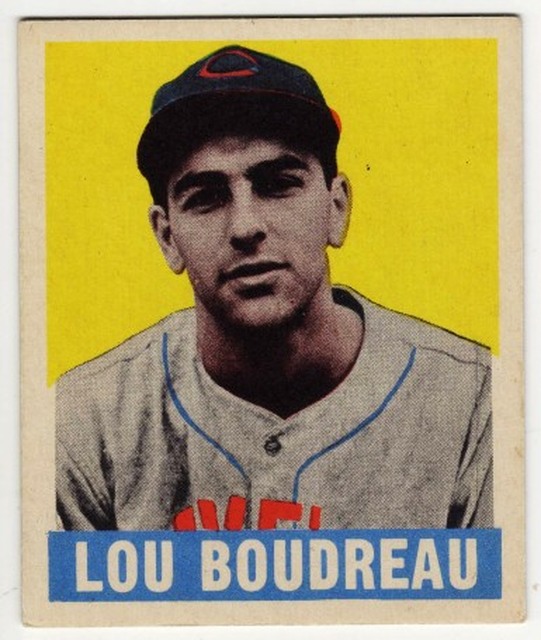 . . 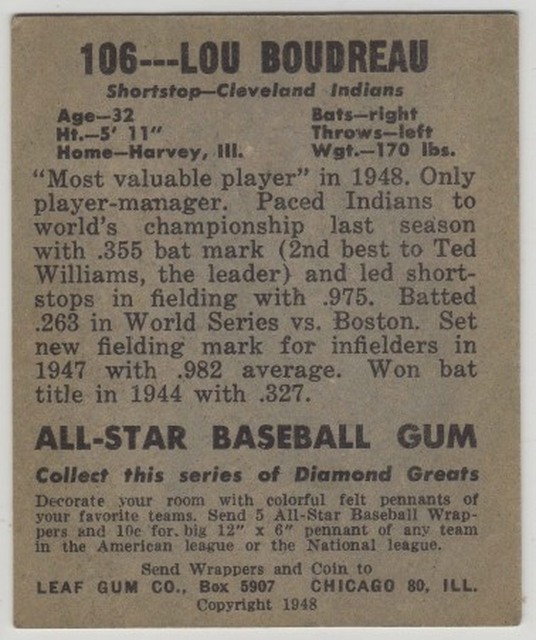 Lou Boudreau's MVP Award was announced in mid December of 1948. Here is an uncut sheet of the 1st Series cards issued in early Spring of 1949. 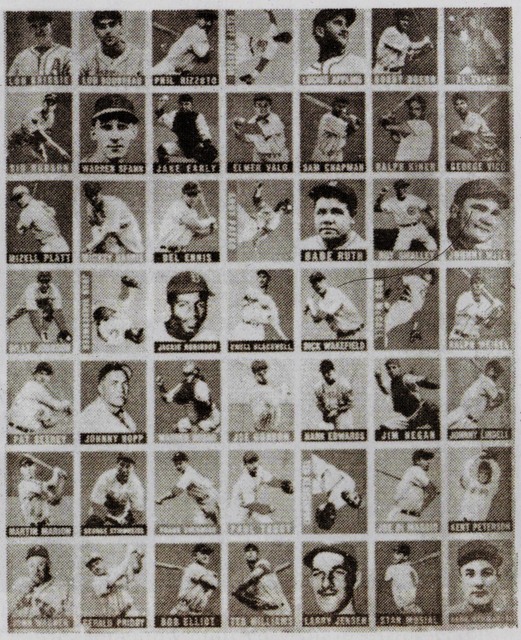 Furthermore, check-out my 8-page story on the 1949 LEAF set in the OLD CARBOARD Magazine (Issue #9). You'll find it very informative and very interesting.....http://oldcardboard.com/misc/issue09/issue09.asp. TED Z T206 Reference . |
|
#11
|
|||
|
|||
|
Just to show you guys how absolutely IGNORANT both PSA and SGC are regarding the 1949 LEAF set, take a close look at the date on the flips of these graded
1949 LEAF HOFer Premiums. WOW ! they are identified as.....1949 ! ! Ten HOFer Premiums were available at our corner candy stores. Each 24-count waxpack box contained one Premium inside the bottom of the box. Sometimes, a generous store manager would reward a kid with a HOFer Premium, when that kid purchased the very last waxpack (or waxpacks) in a given box. Kids would usually acquire a Premium by giving the store manager ten LEAF wrappers and requesting a certain HOFer. Obviously, both PSA and SGC absolutely contradict themselves by having these Premiums dated 1949, but have the LEAF BB cards dated 1948. And, there is no hope that PSA, nor SGC, will ever correct the date on their graded LEAF cards to reflect the true date of 1949. Here are 2 of my HOFer Premiums.....Babe Ruth and the Lou Gehrig. 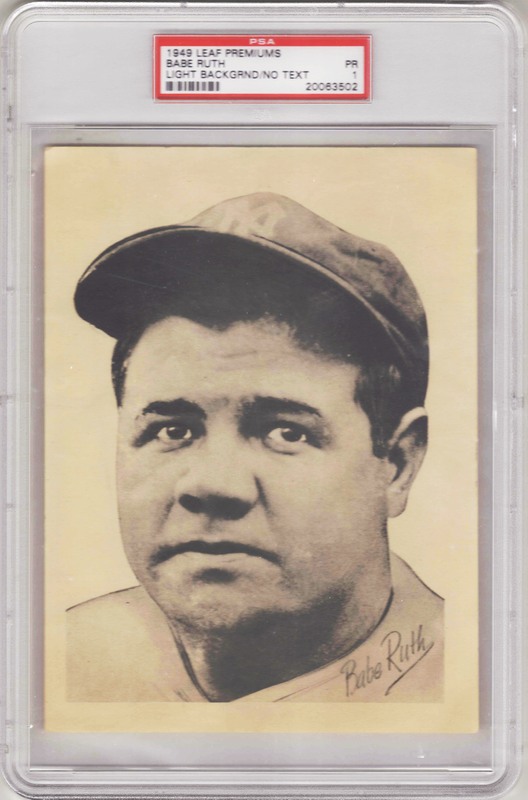 . . 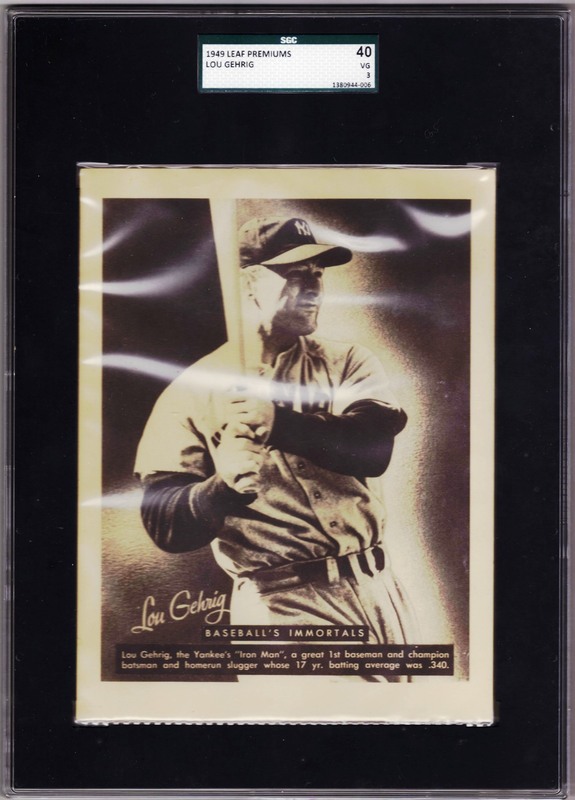 HOFer Premiums Checklist Babe Ruth (light background, no text) Babe Ruth (blue background, no text) Babe Ruth (dark background, text) Grover Cleveland Alexander Mickey Cochrane Lou Gehrig Walter Johnson Christy Mathewson John McGraw Ed Walsh TED Z T206 Reference . Last edited by tedzan; 08-27-2020 at 05:56 PM. Reason: Corrected typo. |
|
#12
|
|||
|
|||
|
Quote:
I believe that those who continue to foist the misidentification of cards upon the unsuspecting have no interest in being honest, especially when it affects their pocketbooks. Card grading services know they generate a significant portion of their revenue from identifying cards people believe are "rookie" cards. Many dealers take advantage of this, especially with higher priced cards, because they can say its a genuine card authenticated by such-and-such grading company. Over a month ago, I contacted PSA about helping them resolve the issues of incorrectly attributing cards as "Bond Bread" ones. I even proposed simple solutions to make correct attributions that did not require them to recall their slabs with wrong identifications. Simply put, first start identifying the cards correctly. They already have population reports, price guides, set registry reports and a myriad of other information on their website about these misidentified cards. They can change the title of those sections to the correct identification AND include a note in each of the corrected sections saying something like, "Information we have obtained tells us that those cards previous labeled as "Bond Bread ****" should be correctly attributed as a card belonging to this set. They are not "Bond Bread *****' cards." The links that were titled with the old "Bond Bread ***** information should not be renamed, but when clicked should jump to the webpage with the correct identification. Of course, just like any other listing, new links with the correct name will have to be included where appropriate. I even suggested ways to relabel the old slabs if the owner wanted them relabeled. That may not remove many of the misidentified cards from the market place, but it's a start. Hopefully, the new information on the website will give some concern to those who may want to pass off the misidentified cards. At least new slabs misidentifying cards as "Bond Bread" will no longer appear. Mike P.S. Can you guess what was PSA's response? Copyright 2020, b Michael Fried, P.O. Box 27521, Oakland, California 94602-0521 Last edited by abctoo; 08-27-2020 at 04:16 PM. |
|
#13
|
||||
|
||||
|
Quote:

__________________
Leon Luckey www.luckeycards.com |
|
#14
|
||||
|
||||
|
Mine:

__________________
Read my blog; it will make all your dreams come true. https://adamstevenwarshaw.substack.com/ Or not... |
|
#15
|
|||
|
|||
|
In my opinion, both your card and Leon's posted just above it are genuine 1947 Bond Bread package insert cards even though they appear to be slightly different because of the amount of ink impressed.
Both of these two cards have creases and other wear that clearly does not make them near mint. I base my opinion that these two are Bond Bread inserts on my belief that most of the high grade Robinson cards of identical appearance come from the Sports Star Subjects sets that were issued in packets that protected them from such wear. My view is controversial because many swear the Sports Star Subjects sets were issued in 1949-1950, and thus its Jackie Robinson card and some others would not be “rookie” cards. However, there are those who have responded to this thread (and elsewhere) who state they obtained packets of the Sports Star Subjects set with “rounded” corners like the Bond Bread package inserts in 1947 (and others who state they received packets with “square” corners in 1947). The 48 card Sports Star Subjects set was issued in four series of different packets of 12, with each packet having two varieties. The difference is the imprint on the back of the packets. Some read “W.S.” / “N.Y” while others have that inscription clearly obliterated. Other than being identified with the Sports Star Subjects and Screen Star Subjects sets, no one responding to this thread was aware of who W.S.N.Y was until an association was made with the similarity in packaging of the “Navy Ships” / “Airplanes” set (W673) for which advertising in 1950 publications was located. The “Navy Ships” packets are printed with “A.J. Wildman & Son, New York” on the back. Thus the Sports Star Subjects (and the related Screen Star Subjects) sets were assumed to be issued about 1950. The contents of the “Navy Ships” set does indicate it could not have been issued earlier than Winter of 1949 as the newest ship/plane card in the set is the Martin XB-51 1st Prototype shown as a drawing that is virtually identical to the real photograph taken of its first flight on October 28, 1949. What was missed was what was started to be discussed on the vintagecards website in 2011 and subsequently about “W.S.,” “W.S.N.Y.C.,” “A.J. Wildman New York,” and related sets. The association to the 1939 “Generals & Their Flags” set with “ © W.S. 1939, N.Y.C. ” printed on the back (and the anonymous 1936 sets of “American G-Men”) and other "W.S." sets from 1938-1942 was beginning to be drawn, as it had not been previously addressed in the ACC or other card catalogs. The additional information about W.S. issuing cards long before 1947 challenges the assumption that the Sports Star Subjects set (that is identical to the 1947 Bond Bread package insert cards) was issued in 1949-1950. W.S. had been issuing a variety of sets of cards from more than 10 years before Bond Bread's 1947 issue. We do have two distinct issues: 1947 Bond Bread package inserts and the Sports Star Subjects set. The cards though, are virtually identical. Since there are statements from various collectors of have received the Sports Star Subjects and Screen Star Subjects sets in packets in 1947, it appears to me that it is incorrect to assume those sets were not issued until 1949-1950. That raises the issue of whether the Jackie Robinson and other cards of those sets are “rookie” cards, but from another set, and then again, which was issued first. The Bond Bread cards were not released until after the start of the 1947 baseball season. The other sets were sold in places like Macys and on newstands. We know these baseball cards from either set were popular back then. Bond Bread issues tens of thousands of each player in bread packages for at least 6 months (and perhaps until the start of the 1948 baseball season). The second set of Sports Star Subjects packets with the “W.S.” / “N.Y” obliterated is indicative of that popularity and the need for more supply. We have found that W.S. was having issues before World War II with the printing of sets (unresolved during the War) that may have caused its name identification to be obliterated for a period of time after the War, and are working on resolving the dating issues. There are other sets (non-sports sets) issued post-WWII through 1950 that came in the same style of packages as the Sports Star Subjects, Screen Star Subjects, and “Navy Ship” sets. Some indicate other publishers while others indicate none. I would appreciate it if anyone who has such a packet would send me a picture in a private message or post it in this thread. Thanks, Mike P.S. [added 4/18/2021] Ted's pictures in this thread of the original 1947 Bond Bread cards he obtained back then suggests he has the highest condition Jackie Robinson and other cards that can be proven to be part of the 48 card set that actually came in Bond Bread packages. The fact that several grading companies placed similar looking cards in slabs they labeled as "1947 Bond Bread" package inserts, particularly those with higher grades, does not establish which of the various similarly looking sets the slab's enclosure came from. Last edited by abctoo; 04-18-2021 at 11:54 AM. |
|
#16
|
|||
|
|||
|
Quote:
Corporate Artists at http://www.corporateartists.com/patti_page.html (accessed 08-27-2020) states about Patti Page: "Born Clara Ann Fowler in Claremore, Oklahoma, one of her earliest recollections is walking barefoot to school and saving her one pair of shoes for Sunday dress-up. With a unique talent and sheer perseverance she has become a sophisticated and sensitive performer with a solid career spanning nightclubs, concert halls, the musical comedy stage, motion pictures, radio and television. "With a scholarship in the art department at Tulsa University in the offing, Clara Ann thought the promise of a job in the art department of KTUL in Tulsa seemed more practical than four years of study. At the time, KTUL had a fifteen minute sustaining program sponsored by the local Page Milk Company called "Meet Patti Page." When the regular girl who performed as the fictitious "Patti Page" left the program, Clara Ann put her natural singing talents to work and got the job... and with it a new name. Soon she was starring on several shows on KTUL. "In 1946, Patti sought greener pastures in Chicago working many dubs and small theaters. Several appearances on ABC Radio's popular network show, "Breakfast Club," hosted by Don McNeil led to Patti securing a program of her own on the CBS Radio Network." Copyright 2020 by Michael Fried, P.O. Box 27521, Oakland, California 94602-0521 |
 |
|
|
 Similar Threads
Similar Threads
|
||||
| Thread | Thread Starter | Forum | Replies | Last Post |
| WTB 1947 Bond bread Cards | Archive | 1920 to 1949 Baseball cards- B/S/T | 1 | 05-18-2007 07:18 PM |
| WTD 1947 Bond Bread Cards | Archive | 1920 to 1949 Baseball cards- B/S/T | 0 | 03-30-2007 09:42 AM |
| F/S 1947 Bond Bread Cards | Archive | 1920 to 1949 Baseball cards- B/S/T | 2 | 09-02-2006 09:32 PM |
| Wanted: 1947 Bond bread Cards | Archive | 1920 to 1949 Baseball cards- B/S/T | 0 | 08-27-2006 04:16 PM |
| WTB 1947 BOND BREAD cards | Archive | 1920 to 1949 Baseball cards- B/S/T | 0 | 06-30-2006 05:21 PM |